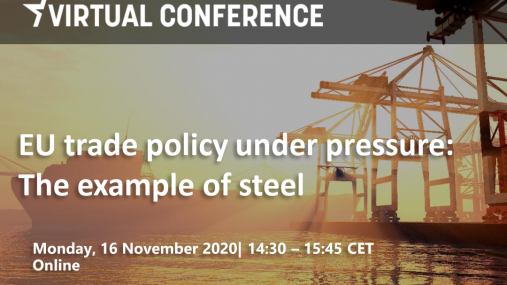
Downloads and links
Download files or visit links related to this content
News » EUROFER supported the 'EU trade policy under pressure: The example of steel' virtual conference
EUROFER supported the 'EU trade policy under pressure: The example of steel' virtual conference
Downloads and links
Recent updates
This event took place on 16 November.
The EU is at a crossroads, having suffered a sharp economic and social hit in recent months. The European Commission predicts a drop in EU GDP of 7.5 per cent in 2020. However, even in 2019, there were signs of underlying frailty in the EU economy.
Despite this, the EU has ambitious plans for its future, aiming to go green, digital and high-tech. But the global challenges remain the same: third countries taking advantage of the EU’s open borders and markets whilst refusing to share the same high ambition to decarbonise by 2050. EU trade policy is thus under pressure. It must evolve to meet rising competition abroad while giving the space for EU companies to
survive, thrive and go green.
This recession will have severe effects on global supply chains, especially if countries around the world seek to dump products on world markets to make up for a loss of local demand.
Join this EURACTIV Virtual Conference, supported by EUROFER, to discuss the crossroads we find ourselves at. If Europe is to thrive, how can EU trade be ready for a vastly different global future? How will industries, such as steel, fare? Questions to be discussed:
How can the multilateral trade framework be strengthened to ensure stability, predictability and a rules-based environment for fair and sustainable trade for EU companies?
16 November, 2020 - online.
14:30 – 14:35 Welcome
14:35 – 14:50 Panelists statements
14:50 – 15:40 Discussion and Q&A
15:40 – 15:45 Closing statements

Download files or visit links related to this content
Brussels, 20 February 2026 – EU steel exports to the United States fell by 30% in the second half of 2025 compared to the same period in 2024, after the imposition of 50% tariffs according to new Eurostat data. The expansion of the U.S. tariff regime to include downstream steel-intensive products, such as machinery and equipment, is expected to amplify its impact on both EU steel producers and their customers. The European Steel Association (EUROFER) said the figures underscore the need for any EU-US trade agreement to be fair, balanced and enforceable.
Joint Industry Statement
Brussels, 11 February 2026 - The European Steel Association (EUROFER) has backed a call to action adopted by European companies and industries in Antwerp today, which includes a demand on the EU to take urgent action to bring electricity prices down as a condition for Europe’s industrial drive, competitiveness and economic resilience.